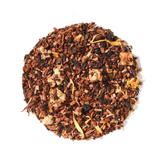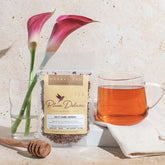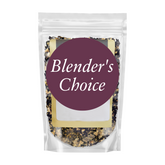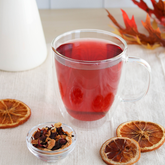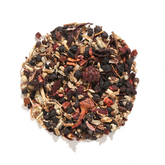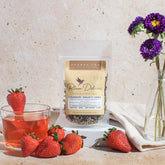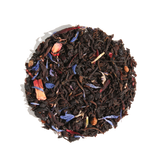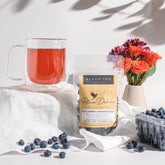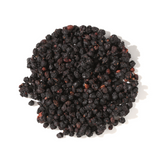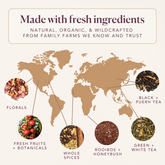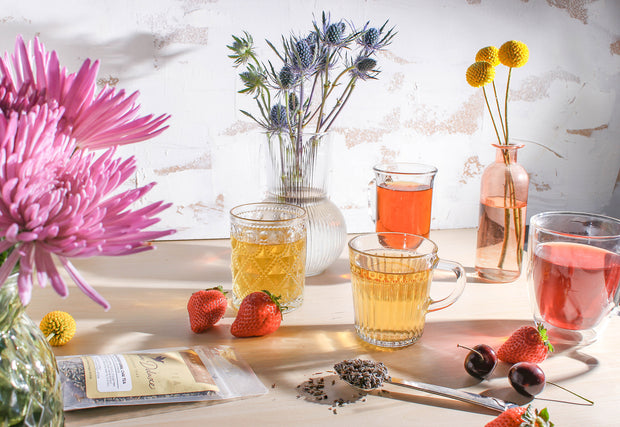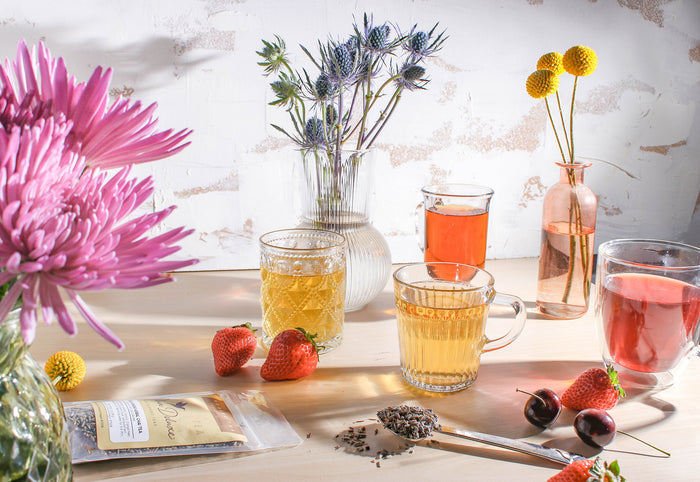I think it's fair to say that most of us in the Plum Deluxe community drink a couple cups of tea a day.
With so many options, what type of tea do you choose?
For me it's often a cup of black tea with milk in the morning and an herbal or two later in the day. What is the difference in herbal tea vs black tea? Let's take a look at these two types of teas.
Herbal Tea vs Black Tea
Since pretty much anything put into water to steep/infuser could be called "tea," what's the main difference between herbal tea vs black tea?
Herbal tea is often called a tisane, since it is usually made from herbs, fruits, and rooibos, an African plant, rather than the Camellia sinensis plant which produces all tea. Herbal tea doesn't contain caffeine and comes in a variety of blends and flavors. Herbal tea doesn't contain caffeine and comes in a variety of blends and flavors. Some common bases of herbal tea blends are rooibos and honeybush tea.
Black tea is the most popular type of tea in the world, making up about 75% tea consumption globally. This dark tea comes in many varieties, and is rich, malty, and well rounded with some astringency. Black tea has the highest level of caffeine with 47 mg of caffeine present compared to 95 mg in coffee. Black tea can have herbal tea-like components, like chamomile or hibiscus, but we still call these black teas.
Types of Herbal Tea vs Black Tea
Herbal tea blends can come in so many different creatively blended flavors, most of which have added health benefits. This pineapple peach herbal tea has chamomile in the blend, which is great for relaxing the body and easing a gassy belly. Another favorite is this caramel cinnamon vanilla herbal tea which tastes like a snickerdoodle cookie. For an immunity boost, you could try this berry echinacea herbal tea.
With so many choices, you really can think of a flavor you are craving or ingredient you want to add into your routine, and use the search option or peruse our lists and find an herbal blend that suits you. Folks usually choose herbal teas based on the fact that they do not have caffeine.
While all black tea contains, well, black tea, there are still several varieties to choose from. The different types of black tea all depend on when and where the tea was grown, how it was processed, and if there are any flavors added to it. You could reach for an English breakfast type tea with this vanilla black tea. Perhaps you'd like to try a Darjeeling grown only in India. Assam is a popular type of black tea. Malty and rich, it is what common bagged teas like Lipton are made of, from a lower quality leaf.
Black tea blends can come in as many flavors as an herbal tea can. Chai are popular teas from India which combine spices along with black tea for a flavorful cup that goes well with milk. This vanilla butternut chai black tea is sweet, spicy, and creamy. Earl Grey is a type of black tea with the citrus bergamot added in for a distinct fruity taste. Our creme brulee Earl grey black tea contains the signature bergamot blended with vanilla for a creamy take on the tea. Black tea also pairs well with fruit, like this strawberries and cream black tea. Black tea can also be nutty, like this pecan black tea. As you can see, there is a black tea for every pallet, whether plain, fruity, spicy, nutty, or chocolaty like this chocolate orange black tea.
Folks usually choose black teas based on the fact that they do do have caffeine. Even decaf blacks have a tiny percentage of their caffeine left after processing.

How to Brew Herbal Tea vs Black Tea
Now that you've chosen whether to have herbal tea or black tea and picked out your blend, how will you brew it? Black teas often take well to milk and a sweetener if you desire, as long as the blend doesn't include an ingredient that will curdle the milk. Most commonly hibiscus or lemon are the culprit.
Some heartier herbal teas can stand up to milk and even make great tea lattes like this chocolate lavender herbal tea. There really isn't a wrong way on how to make a tea Latte with herbal or black tea. The components are tea, frothed milk, and a sweetener if you so choose. I like to steep two teaspoons of tea in four ounces of hot water, check your label for temperature and steeping time. Then mix in any sweetener into the hot tea, and top with frothed milk.
There are many ways out there to froth milk at home that don't require a full espresso machine. We like this hand held frother. Want it even simpler? Try one of our ready to mix tea lattes! You can choose between a vanilla tea latte with a touch of cardamom or our London fog earl grey tea latte mix. Just add hot water to create the perfect tea latte.
If you are one who sweetens their tea, both black and herbal blends can be enhanced with a dash of sweetener. You have options here as well. Try our honey dust mixed with sugar cane or just honey sticks. Typically, herbal teas take well to honey, and black tesa take well to sugar, but this is more to taste than a universal recommendation.
You can also choose to enjoy your herbal tea or black tea as an iced tea. We recommend using the cold brew method. Simply add two teaspoons of tea to eight ounces of cold water, seal and let sit overnight in your refrigerator. Strain in the morning, and enjoy.
This is an easy way to prepare your tea for the day that cuts down on the bitter tannins in black tea. Typically black teas are favored for iced tea vs herbal, but again, this is more to taste than a universal recommendation (for example, herbal teas with hibiscus are phenomenal iced).
Whichever you choose to brew in the question of herbal tea vs black tea, you are sure in for a treat that will hopefully bring you a moment of peace

![Spring Break Tea Variety Pack [6-Pack Variety of Flavors]](http://www.plumdeluxe.com/cdn/shop/files/spring-break-pack.jpg?v=1740682266&width=165)

